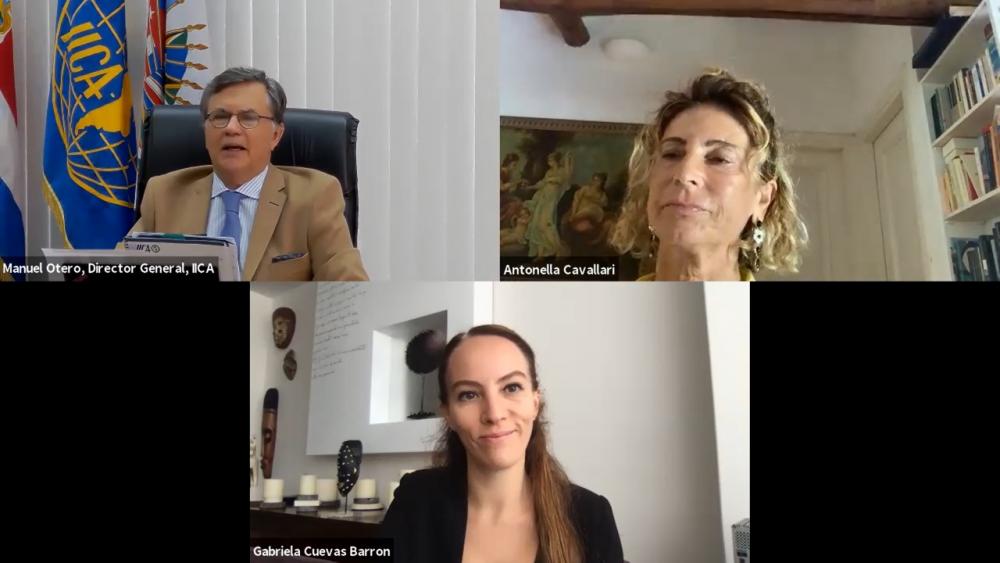International cooperation and solidarity: an effective response to Covid-19

San Jose, 21 August 2020 (IICA). Redoubling efforts to foster effective international cooperation, taking decisive steps towards regional integration, and restoring trust in multilateralism are a few ways to mitigate and overcome the challenges posed by Covid-19 in the hemisphere.
That was one of the ideas shared by Antonella Cavallari, Secretary General of the Italo-Latin American Institute (IILA), and Gabriela Cuevas, President of the Inter-Parliamentary Union (IPU), during a virtual dialogue with Manuel Otero, Director General of the Inter-American Institute for Cooperation on Agriculture (IICA).
The virtual dialogue forms part of an initiative launched by IICA to find answers and gather the perspectives of key international stakeholders, with a view to developing joint solutions that would allow for minimizing the impact of the pandemic on food security in the Americas.
“Moving forward, we must achieve healthy, serious and effective multilateralism. Countries cannot achieve the necessary results on their own; they must work together. Regional integration has proven to be the most successful model during the pandemic”, remarked Cavallari.
Cavallari, who served as the ambassador of Italy in Paraguay from 2013 to 2016, and renowned Mexican congresswoman Gabriela Cuevas, noted that countries have adopted a nationalist approach in their efforts to overcome the health crisis; additionally, high-level international political bodies had failed implement the forceful actions that were expected.
“During the pandemic, international cooperation has been nonexistent. What would have happened if we had responded in a global, coordinated manner, through cooperation and international solidarity? We would have had a vaccine by now, and much more clarity with respect to medicines”, noted Cuevas.
“The border closures that countries have decided to implement is the clearest way to say: ‘I care about protecting my own interests and I’m not interested in international cooperation’. That message is devastating to multilateralism, national interests, bilateral interests, etc. Until we realize that problems can only be solved through international cooperation and solidarity, we will never overcome them”, added former Mexican senator Cuevas.
The specialists agreed on the importance of strengthening multilateral institutions to increase their flexibility and transparency. They also remarked that Covid-19 had accelerated changes related to technological innovation, digitalization and environmental protection.
“We must change production methods and achieve greater social cohesion, given the fact that, amidst the pandemic, not everyone has access to the same resources”, stated the Secretary General of IILA.
“The impact of the pandemic on the fulfillment of the Sustainable Development Goals of the 2030 Agenda suggests that we will be worse off than we were a decade ago with respect to inclusion and the fight against poverty; inequalities are increasing and revealing a development model that excludes and hurts millions of people”, added Cuevas.
Better conditions for farm workers
During the dialogue, Cavallari, Cuevas and Manuel Otero stressed the importance of achieving progress in public policymaking for the benefit of farm workers, who play a strategic role in food production and supply during the pandemic, but whose socio-economic conditions and securities have reached critical levels.
“In many regions, farm workers are immigrants, live in the worst conditions, have the worst wages, and lack access to social security. If we entrust them with our subsistence, we must develop a global, synergistic, coordinated response; it is important to understand that public policies are key, and not only during the pandemic”, stated Cuevas.
“It is a bit of a paradox because we’ve suddenly put the spotlight on farmers and realized that we need them, but this has to be a long-term policy. We must protect them, because they have the difficult, crucial task of putting food on people’s tables. It is also necessary to prioritize agriculture, which has never been fully understood in Latin America”, agreed Otero, Director General of IICA.
Another conclusion reached during the dialogue was that global supply chains must be strengthened. The participants also discussed ways in which trade can achieve better results for all nations.
The role and contributions of women in the international scenario were also discussed, and the participants agreed that the pandemic has widened gender and equality gaps in countries throughout the hemisphere.
“Women are the strength behind our response to the pandemic; we need their leadership and participation to achieve the desired results. We still have a lot of work to do in terms of gender equity, which is one of the issues we are struggling with amidst the pandemic”, stated Cuevas.
“It is crucial that we prioritize agriculture as a strategic, essential and resilient activity. To this end, we must be consistent, working together with and defending rural workers, producers, and, above all, women, who continue to be rendered invisible in the countryside, and whose inclusion is an urgent matter in which we must continue to make progress”, concluded Otero.
Más información:
Gerencia de Comunicación Institucional del IICA.
comunicacion.institucional@iica.int